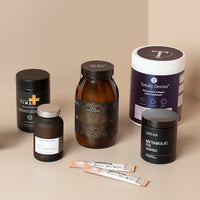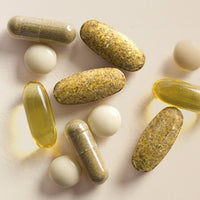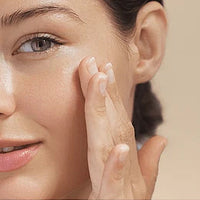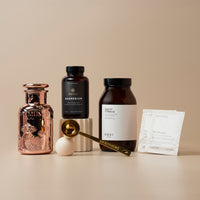From probiotics to phytochemicals, supporting your immune system can be a confusing place. We put some of the W-Edit Community’s top nutrition questions to expert nutritionist Nigel Denby….
How can you support your immune system?
“The immune system is made up of organs, cells and proteins that work together to keep the body healthy and fight infection. In order for the immune system to function properly your body needs sufficient energy and nutrients. Eating a healthy balanced diet is key to achieving this. Ensure that you eat five-a-day, eating a range of fruit and vegetables helps to ensure you get all the vitamins, minerals, and phytochemicals that are needed. Your gut then converts these into beneficial metabolites to fight inflammation. The phytochemicals in a fruit or vegetable are determined by the colour, and so trying to ‘eat a rainbow’ will help to ensure that you include the whole range, including the carotenoids found in red, orange yellow and green plants which have strong associations with immune supporting benefits.
Gut health is also a key factor in maintaining a healthy immune system and there are steps that we can all take to aid a healthy gut. Incorporating probiotics such as yoghurt and fermented foods can help to encourage microbes to grow to keep the gut healthy. Limiting your intake of processed foods, sugars and preservatives can also help to maintain a healthy gut, because these foods can have a negative impact on the natural gut bacteria.”
What are probiotics and prebiotics?
“In order to fully understand what probiotics and prebiotics are and how they are different, it’s useful to learn more about the gut, or more specifically the bacteria in your gastrointestinal tract. These bacteria break down and digest food and help to support the immune system. Prebiotics are what is keeping that healthy bacteria alive, in other words they’re a food source for the microorganisms in your gut.
Prebiotics are plant fibres that stimulate the growth of healthy bacteria in the digestive tract.
They can be beneficial for a number of reasons including encouraging a healthy bowel, positively impacting the hormones that aid appetite, improve bone density and your immune system and help support the body’s anti-inflammatory response.
Probiotics are food or supplements that contain live microorganisms which are intended to maintain or improve the microflora, or good bacteria, in the body. Probiotics are found in a range of foods including yoghurt and fermented foods such as sauerkraut as well as in dietary supplements. Probiotics are well-known for aiding gut health, but they can also benefit the body in a host of other areas including dental and skin health. Whereby they can help to reduce inflammation and manage conditions such as dry skin, eczema and infection.’
What foods support hormonal health?
“Hormones are chemical messengers that play an important part on your mental, physical and emotional health. Your body naturally produces the right amount of the hormones you need to keep you healthy, however lifestyle factors such as stress, diet, and lack of exercise, as well as the natural ageing process, can all impact our hormone levels and send them off kilter. For this reason it’s important to eat a healthy balanced diet in order to encourage hormone health. Ensuring that you eat a diet rich in healthy proteins, high fibre, with lots of fruit and vegetables is the key. Also trying to reduce the amount of alcohol, sugar and processed food in your diet is also beneficial to aiding hormone balance.”
Should I be taking supplements?
“Nutrition, or what we put into our bodies, is the key to ensuring that our tissues, organs, brain and bones thrive and are healthy. However, as we all know life is not always ideal and many people don’t eat a balanced enough diet to obtain all the essential vitamins, minerals and nutrients that their bodies need. Similarly, lifestyle factors such as the fact that many of us have sedentary jobs inside means that we aren’t exposed to sunlight, and therefore aren't making enough vitamin D, for optimum health. For this reason nutritional supplements can be an extremely effective way to ensure that our bodies are getting everything they need to remain healthy. Not all supplements are the same however, and so I would always advise seeking expert advice before embarking on a treatment plan with any supplements.”
Can diet help ease menopause symptoms?
“Diet has a huge impact on your health, especially your hormone health. So some menopause symptoms can be eased by eating a healthy, balanced diet. Some women experience weight gain during the menopause, and so reducing the amount of processed foods, sugar and alcohol can also help to address this. Hot flushes are another common symptom of the menopause which some people find triggered by coffee, aochool and spicy foods, so it may be advisable to try reducing these. Whilst anyone struggling with menopause symptoms should seek medical advice, taking a closer look at diet does, for many, help to alleviate some of the symptoms.”
Top 3 supplements
Dr Nigel’s top three supplements are:
- Good Green Vitality, NuZest
- Gut Love, The Naked Pharmacy
- Menopause Formula, Equi London
All products recommended are available on W-Wellness via your practitioner.









